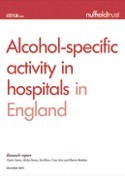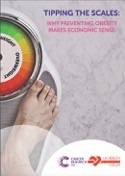News / News review - February 2016
While the junior doctors’ dispute and Jeremy Hunt’s threat to suspend boards that fail to meet financial targets caught editors’ eyes over December and January, in the service the focus was very much on how the NHS would end this financial year and what 2016/17 will bring.
The financial and operational challenges were centre stage at the HFMA annual conference in December. NHS Improvement chief executive Jim Mackey told delegates that the NHS in England had to use 2016/17 to get back into balance, while NHS Trust Development Authority’s Bob Alexander said the NHS could expect an ‘absolute focus’ on finance. A month later, Mr Hunt said his department would take action against trusts that failed to implement efficiency measures. These could include boards losing freedoms and control over key decisions, closer scrutiny from regulators and, ultimately, suspension of the entire board. See the HFMA website (Healthcare Finance, December issue) for full coverage of the conference.
Concern was voiced over the current financial position. Research by consultancy EY concluded that small hospitals in England are shouldering a ‘disproportionate’ burden of NHS deficit in 2015/16. All 20 hospitals with a turnover under £200m are expected to be in deficit, accounting for 8% of total revenues but 11%% of the deficit.
Away from small DGHs, Monitor announced it would examine the finances at County Durham and Darlington NHS Foundation Trust. The trust, which provides acute and community services to nearly 600,000 people, has predicted a deficit of £14.7m for 2015/16. The investigation will help better understand the causes of the financial challenge and the support needed. No decision has been taken on whether or not regulatory action will be required.
A lack of substantive staff – and the consequent need to hire agency workers – is one of the main reasons behind trust financial difficulties. But Health Education England is planning an additional 25,000 to 80,000 staff will be available by 2020. The HEE commissioning and investment plan – 2016/17 says more staff will be trained in every one of the professions where HEE has commissioning responsibilities, and includes growth of nearly 15% in nursing and midwifery.
Health secretary Jeremy Hunt announced six demonstrator sites for the use of the GS1 barcode and PEPPOL communication standards. Each of the sites will demonstrate the benefits of the standards, which can include efficiencies and cost savings, fewer errors and improve patient outcomes and patient safety.
Before the UK health departments updated their alcohol advice in January –  saying risks to health were increased by drinking more than 14 units a week in both men and women – the Nuffield Trust warned that the NHS faces a stark challenge in trying to deal with the consequences of harmful drinking. A report, Alcohol-specific activity in hospitals in England, said emergency hospital admissions due to alcohol had increased by more than 50% in nine years.
saying risks to health were increased by drinking more than 14 units a week in both men and women – the Nuffield Trust warned that the NHS faces a stark challenge in trying to deal with the consequences of harmful drinking. A report, Alcohol-specific activity in hospitals in England, said emergency hospital admissions due to alcohol had increased by more than 50% in nine years.
Parliament approved legislation amending the tariff objection mechanism. The amendments have removed the objection based on share of supply and raised the thresholds for the remaining objection criteria.
In January, junior doctors took their first industrial action since 1975, but subsequently suspended planned 48-hour action later in the month after progress was made in discussions at the conciliation service ACAS. Talks continued as Healthcare Finance went to press, but a nine-hour all-out strike planned for 10 February could still go ahead. As Healthcare Finance went to press, the royal colleges stepped in to urge all sides to reach a settlement.
Trusts were told quality and finance must be considered equally in planning decisions. In a joint letter, NHS Improvement chief executive Jim Mackey and Care Quality Commission (CQC) chief inspector of hospitals Professor Sir Mike Richards, said their organisations would work together to help turnaround trusts with the biggest financial challenges, balancing quality and finance. They will jointly design the framework to be used by the CQC to assess trusts’ use of resources. Both organisations will share staffing guidance and use a new care hours per patient day metric to examine trusts’ management of staff resources.
Providers warned a planned increase in CQC fees risked placing additional financial pressure on an already stretched health and care system. In its response to the CQC consultation on its new fees, NHS Providers acknowledged the need for the watchdog to be appropriately funded, but said proposed rises of up to 75% for a provider were ‘disproportionate and unrealistic’.
NHS England chief executive Simon Stevens launched a first wave of innovation test beds for the health service. The NHS will work with innovators, including IBM and Philips, in seven pilots to harness technology to address some of the most complex issues facing patients and the health service, he said.
The Welsh government has allocated £2.5m to tackle delayed transfers of care from hospital. It said 435 people had their transfer of care delayed in December. This was fewer than the previous month and the third month there had been a reduction. However, more than half of the delays were caused by late community care assessments, delays in the older people choosing care homes or where they had to wait for a place to become available.
With new year resolutions still fresh, there were two reports on the potential costs of conditions that can be related to lifestyle. The Commons Public Accounts Committee said the costs of diabetes to the NHS would continue to rise without rapid action. In a report on the management of adult diabetes, the committee said some progress had been made, but there were ‘unacceptable variations’ in education take-up, delivery of recommended care processes, achievement of treatment standards and in outcomes for patients. It is estimated that diabetes costs the NHS £5.6bn a year. Poorly performing clinical commissioning groups should be identified and interventions made to help them improve, the committee said.
Meanwhile, Cancer Research UK and the UK Health Forum said illness caused by obesity could cost the NHS and social care bodies an additional £2.5bn by 2035 if current trends continue. They said almost three in four adults would be overweight or obese in 20 years, leading to an additional 670,000 cases of cancer. Tipping the scales: why preventing obesity makes economic sense made policy recommendations including increasing taxes on unhealthy foods, restricting marketing to children and investment in activity.
The month in quotes
‘Over the next decade major health gains won’t just come from a few “miracle cures”, but from combining diverse breakthroughs in fields such as biosensors, medtech and drug discovery, mobile communications and AI computing. Our NHS test beds programme aims to cut through the hype and test the practical benefits for patients.’
NHS England chief executive Simon Stevens
‘2016/17 is a firebreak year where we at the centre have got to do the best job to create the conditions and environment that give everybody the best chance of success. But you will have to move heaven and earth to get towards that success.’
NHS Trust Development Authority chief executive Bob Alexander
‘We are training significantly more people to work in every healthcare profession than we anticipate retiring or leaving between now and 2020. Between 2012 and 2016, we will have placed an additional 115,000 nursing and midwifery commissions into universities.’
Health Education England chief executive Professor Ian Cumming
‘The NHS and Department for Health have been too slow in tackling diabetes, both in prevention and treatment. The number of people with diabetes is increasing, as is the number of patients who develop complications. It is a very serious condition that can have a huge impact on people’s lives. Yet support available to patients and those at risk varies hugely across the country.’
Commons Public Accounts Committee chair Meg Hillier
In the media
Despite the usual lull around the Christmas holiday, the HFMA has been well featured in the media.
Some of the widest coverage was drawn by December’s annual conference, which was covered by The Guardian and trade press such as Public Finance and Health Service Journal. The Guardian story on a clampdown on overspending trusts included quotes from NHS Improvement chief executive Jim Mackey’s speech to delegates. Some trusts would have to ‘go through a very painful process’, he said.
The HFMA/CIPFA report on the better care fund was well covered in the trade press, which said collaboration was happening but progress was being held back by red tape. HFMA policy and technical director Paul Briddock told Hospital Doctor it was positive that six months after the fund began organisations were starting to integrate services, but streamlining and simplification of processes was needed.
The Huffington Post contacted the HFMA for an article on trusts needing working capital loans to pay wages and the cost of those loans. The association said there was a balance to be struck between imposing extra costs on organisations in financial difficulty and giving them penalty-free support. The message from the centre was that this was not an easy route to money, it added.
As the dust settled on the spending review, Mr Briddock said in an article for Public Finance that NHS finance staff faced the challenge of finding a way to meet short-term financial targets, while ensuring improvements in the future.
Related content
The Institute’s annual costing conference provides the NHS with the latest developments and guidance in NHS costing.
The value masterclass shares examples of organisations and systems that have pursued a value-driven approach and the results they have achieved.